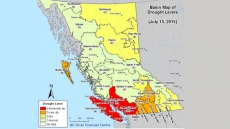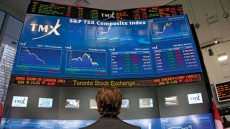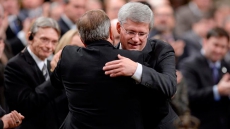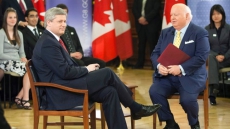The new federal cabinet has a lot of issues to tackle, and not a lot of time to learn their files. Here is an idea of what each new minister faces:
Minister of Public Safety and Emergency Preparedness Ralph Goodale: The new public safety minister must tackle the reversal of some of the more contentious anti-terrorism provisions contained in Bill C-51, and oversee a promise from the Liberals to have more parliamentary oversight of Canada's national security agencies.
Minister of Agriculture and Agri-Food Lawrence MacAulay: A former farmer heads up a portfolio where dairy farmers are concerned about the effects of a new trade pact on their livelihoods, and where he will have to go overseas to sell Canadian products and produce to emerging markets.
Minister of Foreign Affairs Stephane Dion: Dion will become Canada's face on the international stage (when Trudeau isn't available) and deal with counterparts in the United States, Canada's largest trading partner, members of the G7 and G20 group of nations, and oversee a foreign service in charge of diplomatic duties around the world.
Minister of Immigration, Refugees and Citizenship John McCallum: The Liberals committed to bringing 25,000 Syrian refugees to the country before the end of the year, a promise that carries a lot of logistical issues to tackle — including how to bring them here and where to house them upon arrival — and not a lot of time to get it done.
Minister of Indigenous and Northern Affairs Carolyn Bennett: Bennett has spent years working on the Liberals' relationship with First Nations and she'll have to use those skills in what will be difficult consultations on the scope of a promised inquiry into missing and murdered indigenous women.
President of the Treasury Board Scott Brison: Public service unions were quite happy to see the Conservatives lose the election, even actively campaigning against them, and it now falls on Brison to deal with the unions and the outstanding contract negotiations where issues like sick leave remain outstanding.
Government House leader Dominic LeBlanc: With an ambitious legislative agenda, it falls to the House leader to make sure that bills and business are organized wisely in the Commons.
Minister of Innovation, Science and Economic Development Navdeep Singh Bains: The federal government annually hands out grants to companies that work on developing new technologies and, in the process, create jobs; the Liberals promised during the election campaign to help companies that develop green technologies.
Minister of Finance William Morneau: The finance portfolio may be the most high-profile portfolio outside of prime minister. Morneau will be in charge of setting the government's budget so that they don't run deficits more than $10 billion, as they promised in the campaign, and keeping a close eye on the economy to make sure the Liberals can meet a promise to balance the books by the end of their four-year mandate.

Minister of Justice and Attorney General Jody Wilson-Raybould: The federal government is running out of time to craft new right-to-die laws after the Supreme Court of Canada struck down the existing provisions earlier this year. Wilson-Raybould will have to oversee that legislation and how the government goes about legalizing marijuana.
Minister of Public Services and Procurement Judy Foote: Foote is in charge of one of the largest departments in the federal government and some of its biggest procurements, including replacements for the aging CF-18 fighter jets. The Liberals vowed not to buy the F-35, but also promised an open competition.
Minister of International Trade Chrystia Freeland: As one of the last acts in government, the Conservatives signed on to the Trans-Pacific Partnership, a massive trade pact with Pacific Rim countries. Trudeau said on the campaign trail that he wanted to read the agreement before taking a stance on it; whatever the stance, it will be up to Freeland to handle the fallout.
Minister of Health Jane Philpott: The provinces have direct responsibility for health care, but rely on the federal government for funding. Philpott will be talking with the provinces who want more money and commitments that funding will rise higher under the Liberals than under the Conservatives.
Minister of Families, Children and Social Development Jean-Yves Duclos: Replacing the universal child care benefit with a new, income-tested benefit for families with children will be top on Duclos's list of priorities. Also on his radar will be working with the provinces on some type of a national child care program — a promised vaguely spelled out in the Liberal platform document.

Minister of Infrastructure and Communities Amarjeet Sohi: A cornerstone of the Liberal plan to grow the economy was to spend an extra $16.9 billion over the next four years on infrastructure across the country that include public transit, social infrastructure and "green" environment.
Minister of Transport Marc Garneau: The Lac-Megantic rail disaster in July 2013 focused attention on rail safety in the country, but that isn't the only issue that Garneau will have to deal with: How to deliver security at airports, deal with shipping issues at the nation's ports, and a new crossing of the Detroit River to ease congestion at the busiest border crossing between Canada and the United States.
Minister of International Development and La Francophonie Marie-Claude Bibeau: Despite work to improve maternal and newborn health abroad, the previous Conservative government was criticized for not doing enough on the international aid front. Trudeau said Canada would do more on international aid, with Bibeau in charge of those efforts.
Minister of Natural Resources James Carr: The previous Conservative government put a heavy emphasis on turning Canada into a natural resources powerhouse. Oil prices remain low and there are still issues surrounding the development of the mineral-rich Ring of Fire region in Northern Ontario.
Minister of Canadian Heritage Melanie Joly: The Liberals made promises to increase funding to cultural groups, but also roll back cuts at the CBC. Joly will oversee all that along with now fairly advanced plans to mark Canada's 150th birthday in 2017.
Minister of National Revenue Diane Lebouthillier: The Canada Revenue Agency was roundly criticized for auditing charities whose political activities ran against the Conservatives. The Liberals have promised to change that and crack down on international tax cheats.
Minister of Veterans Affairs Kent Hehr, also associate minister of National Defence: The Conservatives outraged veterans with the closure of service offices. Hehr will have to repair relationships on the file and find ways to deliver services to veterans young and old.
Minister of Environment and Climate Change Catherine McKenna: First challenge for the Ottawa MP happens at the end of the month when international climate change talks in Paris take place with countries ready to set ambitious goals for reducing greenhouse gases.

Minister of National Defence Harjit Singh Sajjan: Canadian fighter jets and soldiers remain at war with the so-called Islamic State in Iraq — a military commitment the Liberals have vowed to end with Sajjan, who served three tours of duty in Afghanistan, to oversee the withdrawal.
Minister of Employment, Workforce Development and Labour MaryAnn Mihychuk: The Liberals have promised to create tens of thousands of jobs for young people and repeal laws that required unions to disclose finite details of their spending — two issues that Mihychuk will have to oversee in this newly created portfolio.
Minister of Democratic Institutions Maryam Monsef: The Liberals promised that last month's federal election would be the last under the first-past-the-post system. Monsef will have to oversee what will take over in its place, such as a ranked ballot or proportional representation.
Minister of Sport and Persons with Disabilities Carla Qualtrough: Overseeing Sport Canada, Qualtrough will keep an eye on the purse strings that have helped turn Canada into a more competitive nation at the Olympics and other international competitions, but also make sure that there are opportunities for all Canadians to participate in sports.
Minister of Fisheries, Oceans and the Canadian Coast Guard Hunter Tootoo: Fishing is a major employer on two of Canada's coasts while the Canadian Coast Guard is responsible for all three coasts. Tootoo will have to oversee ways to improve search and rescue response times, keep fisherman happy and employed, and the annual seal hunt.
Minister of Science Kirsty Duncan: The Liberals vowed that decisions around the cabinet table would be based on science and research. They also promised to bring back the mandatory long-form census that could be in place in time for the next national census in 2016.
Minister of Status of Women Patricia A. Hajdu: It has been five decades since a royal commission on the status of women identified a slew of hurdles women faced to full political, legal and workplace participation. Hajdu will have to see what still needs to be done in Canada, and also be an advocate for women's rights on the world stage.

Minister of Small Business and Tourism Bardish Chagger: Trudeau caused waves in the election campaign when he said a large number of small business tax filers were really wealthy Canadians incorporating to take advantage of the lower tax rate. The Liberals plan to reduce that rate further and Chagger will have to handle how to make that happen with new rules Trudeau wants to make sure the country's top earners aren't using the small business tax rate as a tax shelter.





